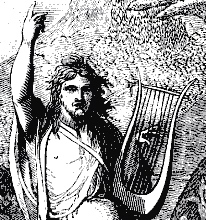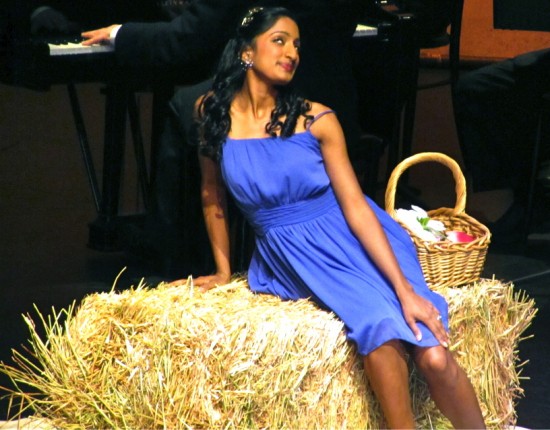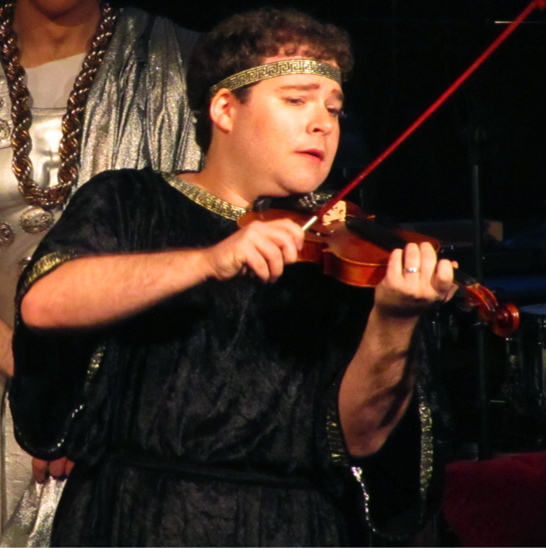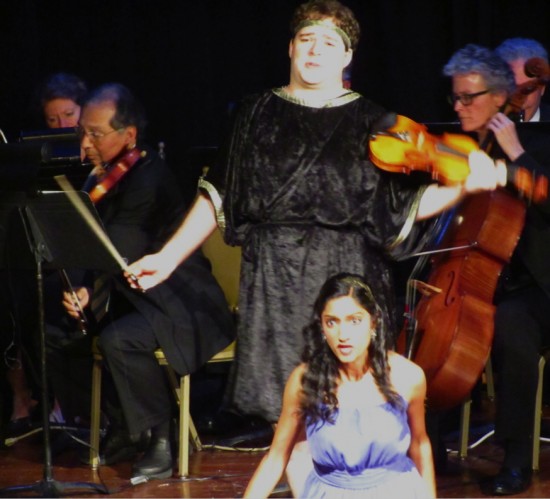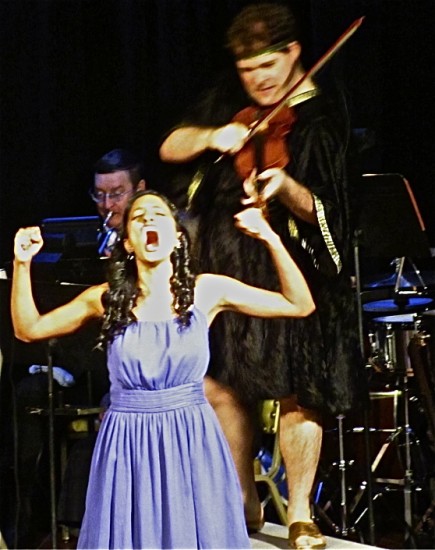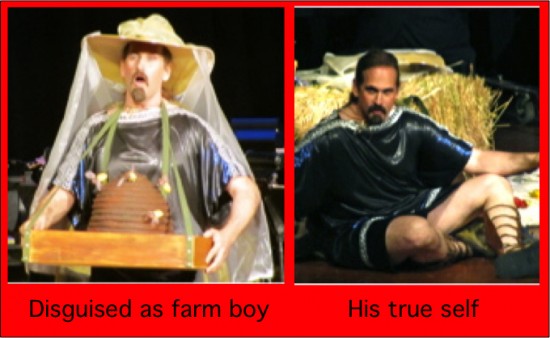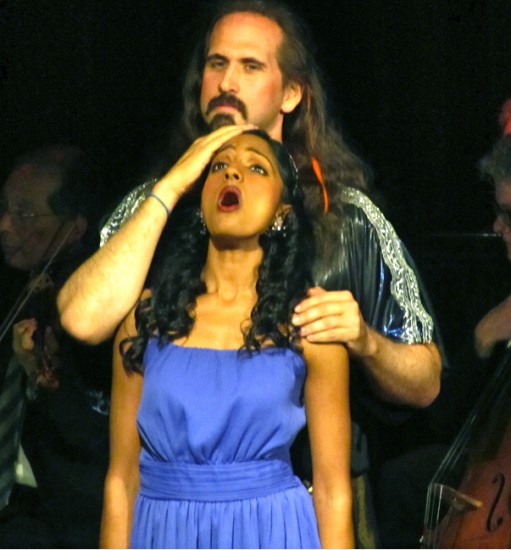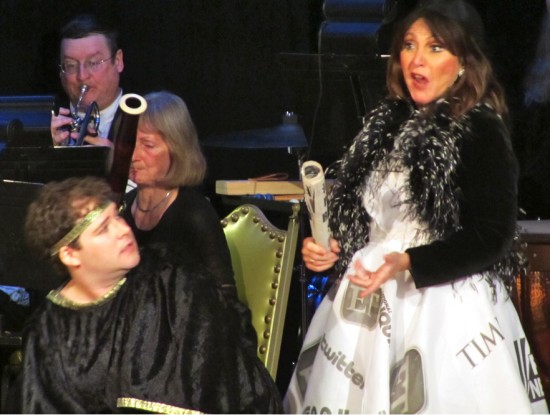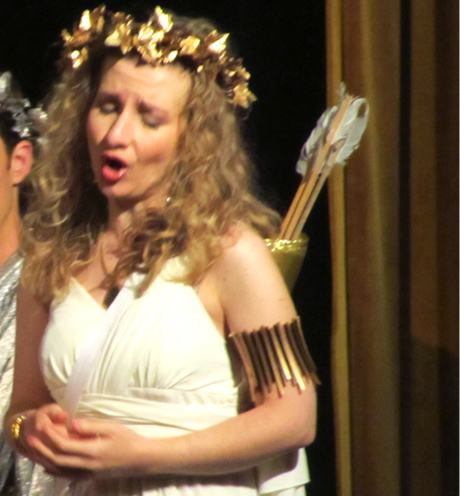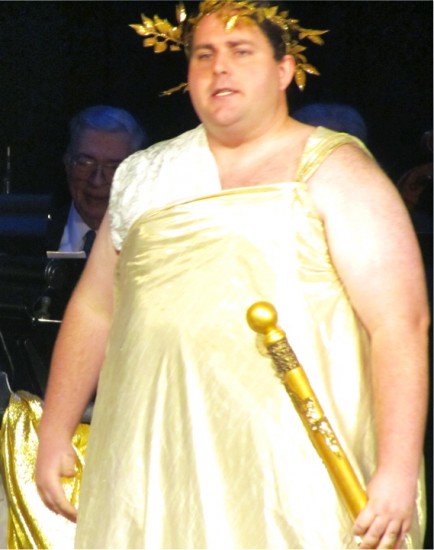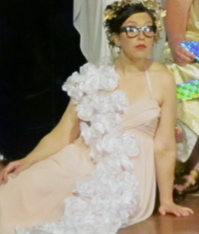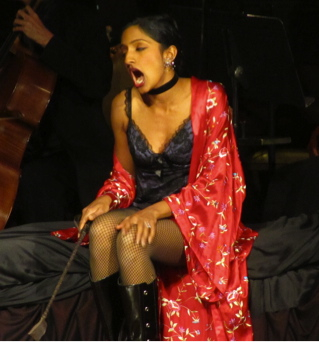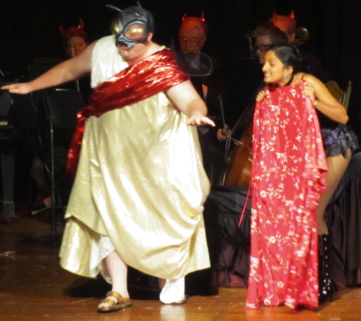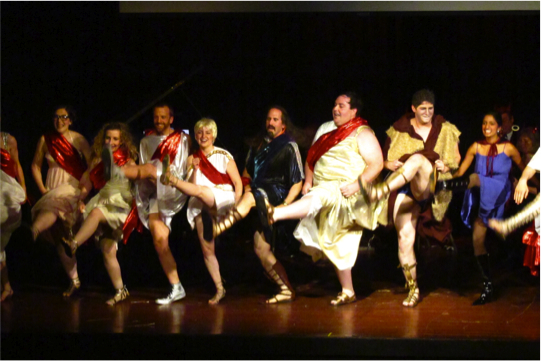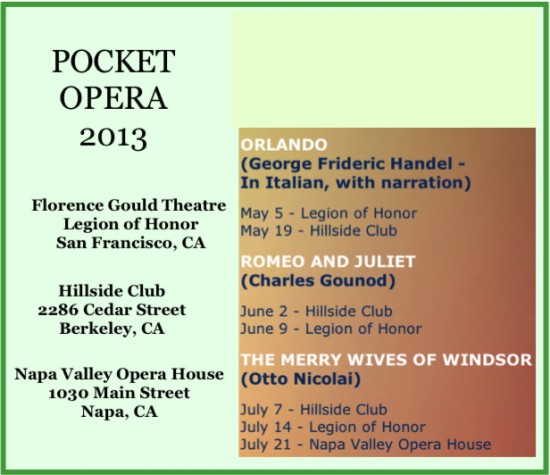Offenbach¬†is one of¬†Donald Pippin’s favorite opera composers, and¬†Orpheus in the Underworld¬†is one of his operas most often produced by¬†Pocket Opera. Sunday April 24, 2013 was the third different production I have seen in the past 20 years. I discovered Pocket Opera just too late to see it in 1993, but I saw it in 1999 and again in 2008. However, I was not writing reviews back then so it is reasonable to say that this is the first time The Opera Nut has seen it.
The myth of Orpheus and Eurydice lies deep in Greek pre-history. Orpheus is part divine; some say he was a grandson of Apollo. In any event, he was the most gifted musician in all mythology – his lyre-playing could not only captivate gods and humans, but he could make trees and stones dance. He and Eurydice were married, but on their wedding day she was bitten by a venomous snake and died instantly. Orpheus was grief-stricken, but resolved to go to Hell and try to bring her back to life. His music charmed all the guardians of Hell and even charmed Hades himself. The god agreed to let him have Eurydice, but only with a strict condition. During the entire long journey back to earth, he must lead and she must follow with no communication allowed. She must not touch him and he must not look back; neither may speak. Violation before both are fully back to earth will result in her being instantaneously whisked back to Hell for all eternity. They follow the rules until Orpheus at last has both feet on earth when without thinking he looks back to be sure she is still following him. Alas, she still has two more steps to go. He has violated the rules and she is lost to him forever.
Obvious material for an opera plot. Indeed probably the oldest surviving so-called modern opera is Euridice¬†by¬†Jacopo Peri¬†and¬†Giulio Caccini¬†first performed in 1600. Only seven years later¬†Monteverdi wrote¬†L’Orfeo¬†– his first opera. Those two owned the story for a century and a half until¬†Christoph Willibald Gluck¬†came out with¬†Orfeo ed Euridici¬†in 1762. All of these operas were essentially a retelling to music of all or part of the original myth.
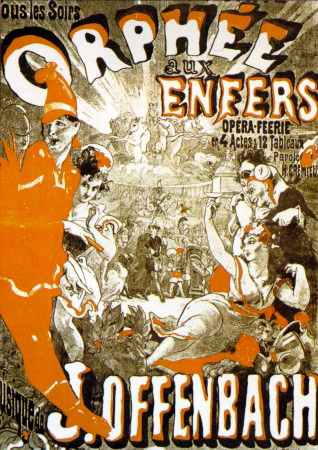
Poster for a performance of the French version of Orpheus in the Underworld; photo courtesy Wikimedia Commons
It was another century before¬†Jacques Offenbach¬†cast his irreverent eye and ear on¬†Gluck’s opera and the original myth and mused, “Hmm. I wonder what the real story was like?” I understand that the libretto written by¬†Ludovic Hal…vy¬†and later revised by¬†Hector-Jonathan Cr…mieux¬†contained various topical references to late 19th¬†century France. In keeping with this spirit,¬†Donald Pippin’s adaptation to English is delightfully up-to-date but includes all the brilliant absurdity of¬†OffenbachĎs plot.
Scene 1 sets the stage. Eurydice (Maya Kherani) is already married to Orpheus, already bored to tears by him, and having an affair with a handsome farm lad who is expected momentarily. She hears someone approaching, assumes it is her lover, and feigns sleep curling up on the couch with her back turned in anticipation of the pleasure of having him wake her up.
Instead, it is Orpheus (Michael Desnoyers) who enters the cottage, bemoaning his loveless marriage, anticipating a tryst with his current nymph, and sawing away on his violin – Yes, I said “violin”. Whereas the Orpheus of myth played the lyre with unsurpassed beauty,¬†OffenbachĎs creation is a third-rate violinist. And herein lies a potential problem. How, in an opera, do you represent poorly performed music? For a very few notes you could get away with an actual scratchy screech, but Orpheus plays for a full number. If you actually present it realistically, the audience will probably leave.
The solution is that¬†Desnoyers¬†only mimes playing, and the third-rate quality of his playing is suggested by the ridiculous quality of his miming. He “plays” between his legs, over his head, behind his back – all with exaggerated sweeping motions and with limited regard for the rhythm of the music. At one point he even holds the bow in his teeth and moves the violin back and forth across it. Meanwhile, the actual sound is coming from¬†Yasushi Ogura, violinist for the¬†Pocket Philharmonic, seated at the back of the stage, and playing the composer’s tuneful and harmonic music.
After a bit of these antics, Orpheus puts down his violin and bends over to kiss the sleeping figure he assumes is his nymph; Eurydice opens her eyes expecting to see her farm-lad; both are horrified to behold their lawfully- wedded spouses instead.
There ensues some nice dialog and duet singing as each blames the other for their unhappy marriage, but Eurydice cleverly turns the discussion away from infidelity to a criticism of Orpheus’ music:
No, no, your music has no merit;
None but nincompoops can bear it
Oh, the torture and chagrin
Each time you touch the violin!…
Eventually Orpheus storms out of the cottage in search of his nymph, Eurydice’s lover shows up, and we’re treated to some more lovely duet music.
It turns out that the “farm-lad” appearance is but a disguise for Pluto (Daniel Galpin), God of the Underworld.
Eurydice is dazed rather than fazed by this deception and dies blissfully in his arms:
So near I feel the hand of death!
Of pain or terror not a trace.
A sigh, a letting go of breath,
Then yielding to a soft embrace…
I travel toward a friendly shore
Where none can weep and none can mourn,
And close to him that I adore,
In death I find a life reborn…
They leave and Orpheus returns, despondent at not having found his nymph. He brightens immediately when he discovers that Eurydice has left him, but is joy is short-lived. Public Opinion, aka “The Polls” shows up (in the person of¬†Diana Kehrig) and informs him that it is his duty to go after his missing wife. Otherwise,
Rebellious poet, expect no mercy!
I shall haunt you and hunt you down.
With bad reviews and controversy
I’ll drive you sniveling out of town…
Orpheus submits reluctantly, she grabs him by the ear as if she were the domineering mother of a recalcitrant schoolboy, and they are off to
SCENE 2
OLYMPIC HEIGHTS
where the Greek Gods are extremely bored:
DIANA (Stacey Lichter)
To hell with nectar and ambrosia!
I have had it up to here!
VENUS (Megan Stetson)
Give me beef and a glass of beer!…
Realistically, boredom leads to bickering until Jupiter (Sean Irwin) shows up and they all turn against him, threatening to revolt.
Minerva (Elana Cowen) is particularly scathing:
By all accounts, a cad and coward!
So you became a horny bull!
And though Europa you deflowered,
It was a sleazy stunt to pull.
Jupiter, the superstud, the universal sham!
What a great impersonator! What a hunk of ham!…
But before the revolt can get organized Orpheus and Public Opinion show up and Orpheus reluctantly pleads his case. Jupiter welcomes the interruption – “I will go down to Hades and bring her back.”
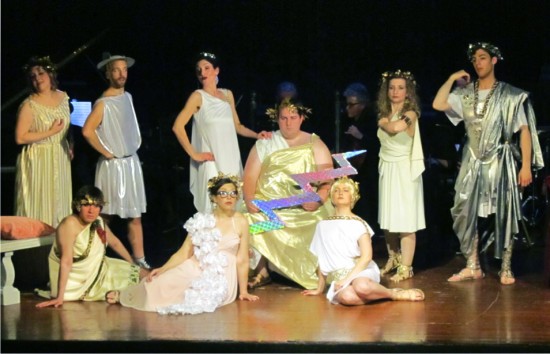
The Olympic Heights Gods: (L to R) Back row Juno (Sonia Gariaeff), Mercury (Samuel Palmer), Venus (Megan Stetson), Diana (Stacey Lichter), Mars (Alex Tarczynski); Seated Jupiter (Sean Irwin); Front row Bacchus (Alan Briones), Minerva (Elana Cowen), Cupid (Chelsea Hollow)
The gods immediately jump on this diversion from monotony: “Oh, Daddy, can I come too?”, “Please, Daddy, let me come.”, etc. “Sure, why not,” Jupiter says agreeably, and the Act I curtain descends as they all traipse off stage on their way to Hell.
As you return to your seats after intermission, forget all preconceived notions you may have had about Hades being a drab and dreary place in which to spend eternity. Like Olympic Heights, it has colorful characters and diverting intrigues. Eurydice is just as bored there as she was on earth, since Pluto is too tied up in petty administration to pay any attention to her. I don’t have space for details, but I must mention two memorable scenes.
For cogent reasons Jupiter has disguised himself as a fly. No one would describe his portrayer¬†Sean Irwin¬†as either short or skinny, and I defy you to keep from laughing as he dances daintily around Eurydice, singing “Zi zi zi” in a falsetto voice.
Pluto’s personal servant John Styx (Andrew Nickell) has an enormous body and is perhaps not all present in his head. But when he hears the rousing music of the “Can-can” he jumps right into the line of dancing gods, raising his servant’s smock to give us a good look at his bony knees.
All of the performers were good singers and almost all were good actors, but the unquestioned star was Maya Kherani as Eurydice. She had a fine soprano voice and her facial expression and body language told her every mood, from anger to boredom to ecstasy.
And the surprise ending left everyone happy including Public Opinion – both on the stage and in the audience.
P. S. This was the final performance of Orpheus in the Underworld. However the 2013 Pocket Opera season is still going strong, so you can still see an opera a month, May through July:
Photos:
Except as stated otherwise, photos by Robert Selinske, Pocket Opera Board of Directors
Tables and photo arrangements by Philip Hodge.
Dialogue quotes from¬†Donald Pippin’s libretto on Pocket Opera website
This review by Philip G Hodge appeared in sanfranciscosplash.com on May 5, 2013.

